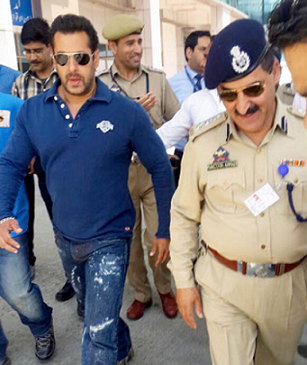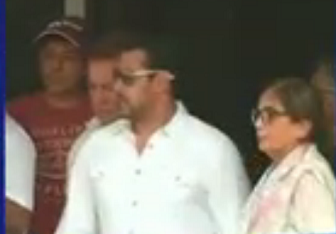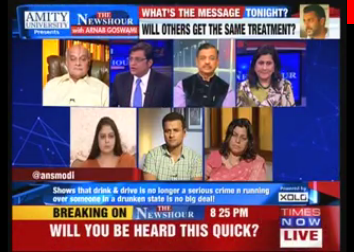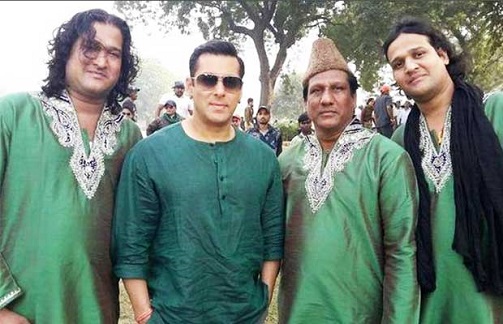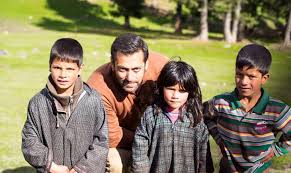Salman Khan: hit-and-run case, 2002

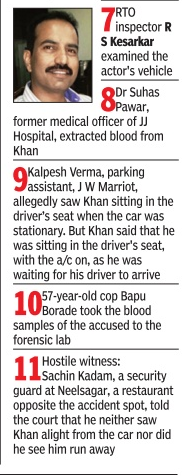
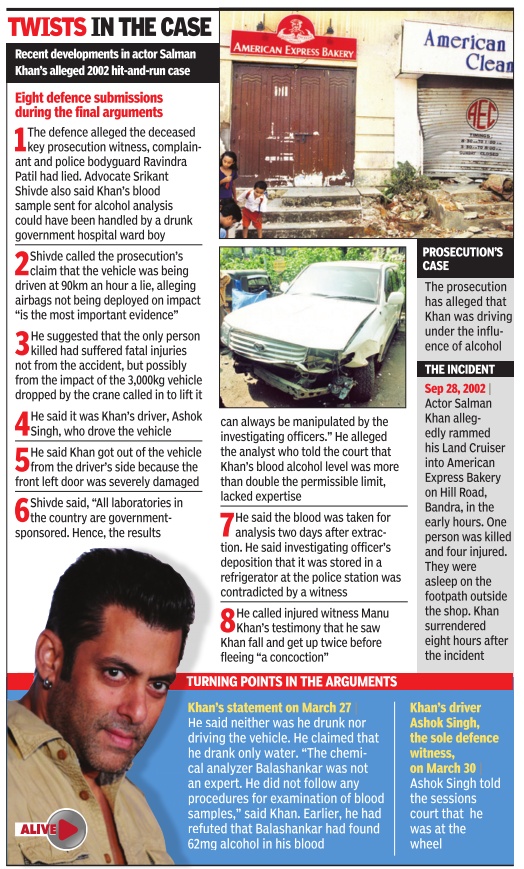
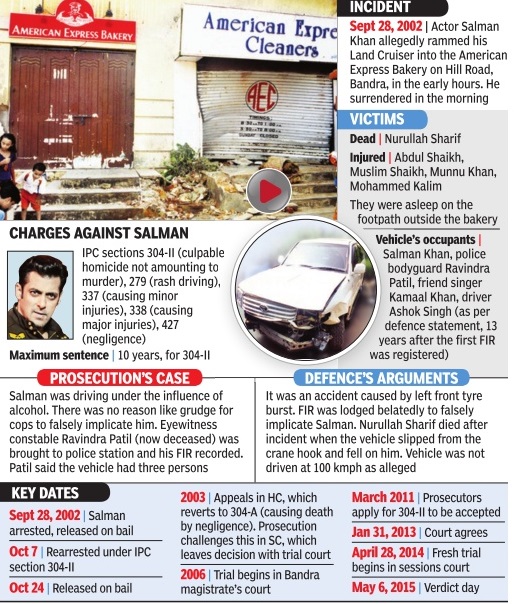
In May 2015 a sessions court convicted Mr Khan under Section 304 of the Indian Penal Code
Details of the case will be found elsewhere on this page,
Graphic: The Times of India
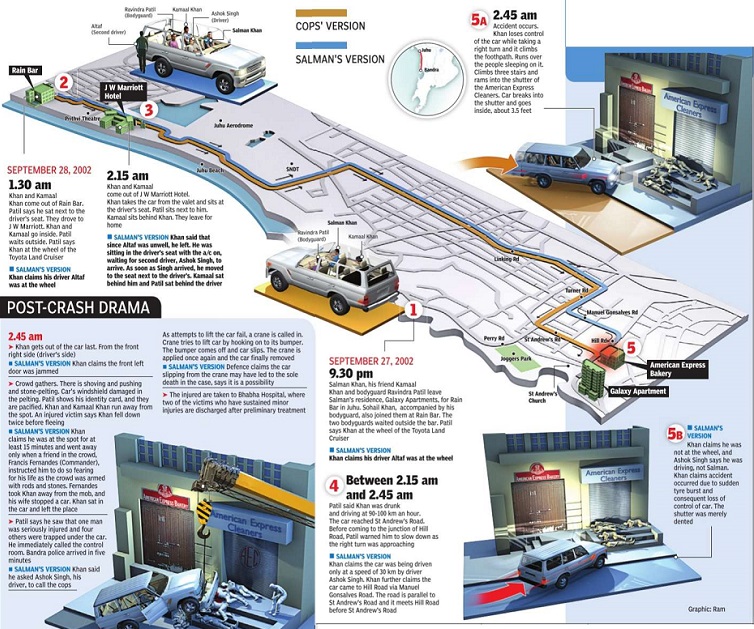
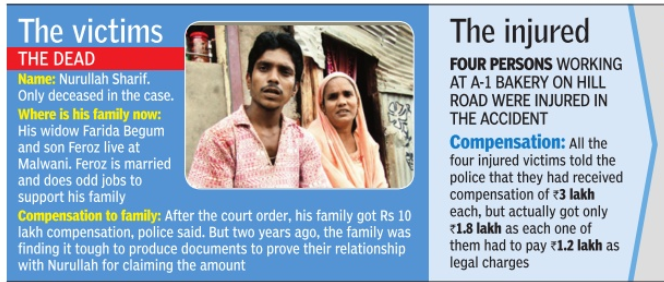

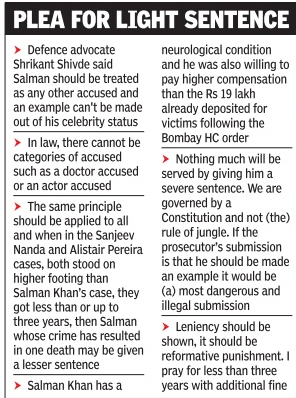

See also Indpaedia's main page Salman Khan, film actor
This is a collection of articles archived for the excellence of their
content. You can update or correct this page, and/ or send photographs to the Facebook page, Indpaedia.com. All information used will be duly acknowledged. |
The authors of this page are...
Below you will find all the facts that most people need. However, for a detailed account please got to the page Salman Khan: hit-and-run case, 2002
Rebecca Samervel, The Times of India

i)Salman Khan charged with culpable homicide, pleads not guilty; ii) Saw Salman Khan Getting Out of Driver's Side: 2002 Hit-&-Run Witness/ Abhinav Bhatt | Tuesday May 6, 2014. iii) Waiter Identifies Salman Khan, Says he Served Drinks to the Actor's Group | Press Trust of India | Monday May 19, 2014
NDTV Edited by Surabhi Malik | July 24, 2013 NDTV.com
The incident
In September 2002, actor Salman Khan was allegedly driving a Toyota Land Cruiser that ran over a group of people sleeping on the pavement outside a bakery in suburban Bandra. Nurullah Mehboob Sharif was killed and four others were injured after Khan’s Toyota Land Cruiser ran up the stairs of American Express Laundry on Hill Road at Bandra in the intervening night of September 27 and 28, 2002.
Victims refused to be bought
Mohd Kalim (Victim of Hit & Run case) reacted to the judgement holding Khan guilty: 'We are happy with the Salman Verdict , but we should also be given compensation.'
The victims, despite their poverty, refused to be bought
Poor victim refused Rs 5L hush money, Arshad Afzal Khan & Arunav Sinha The Times of India
There was a certain degree of nonchalance among members of a family directly linked to the case as they followed the verdict from 1,500km away in UP's Gonda. Niyamat Sheikh, whose son Muslim was one of four injured in the accident, shook his head dismissively when asked for his reaction. “We have no interest in Salman's conviction. My son has lost his youth. He cannot walk properly and is unemployed,“ he said. [In 2014], Muslim was allegedly offered Rs 5 lakh by his exlawyer to change his statement, but despite his poverty, he has steadfastly stood by the prosecution.
The progress of the case
Khan was arrested and freed the same day after a medical check-up. He was rearrested in October 2002, but got bail from the sessions court.
The trial began in October 2006 at the Chief Metropolitan Magistrate Court at Bandra [under the lesser charge of causing death by rash and negligent driving, which would have carried a maximum punishment of only two years in jail].
In 2012, the magistrate ruled in favour of an enhanced charge under Section 304 II of the IPC (culpable homicide not amounting to murder) and transferred the case to the Mumbai sessions court for a fresh trial.
In 2013, the sessions court framed charges under the aforesaid more stringent Section. Earlier, the actor had faced the charge of causing death by negligence under Section 304-A of the IPC.
Now he also faced the charges of rash driving under Section 279 and abetment of assault under Section 134 of the IPC, besides those under the Motor Vehicle Act. He was also charged in 2013 under sections 279 (for rash and negligent driving), and 337 and 338 (causing grievous hurt).
Why the graver section was added
The graver section was added after key prosecution witness, Khan's bodyguard, policeman Ravindra Patil, who was present in the car, told the police that the actor had been driving drunk. Patil died in 2007, but his examination before the magistrate court was included in the present trial. During the final arguments, defence advocate Srikant Shivde, however, opposed this inclusion and said his statement before the court was taken when Khan was being tried for the lesser charge of rash and negligent driving.
How Salman got booked under stringent law
Prafulla Marpakwar, The Times of India
Had the state home department then led by NCP leader Chhagan Bhujbal not substituted section 304 A with more stringent section 304-II, Salman Khan would have been let off with a minor punishment. The Bandra police had initially registered an offence under section 304 A--rash and negligent driving but not amounting to culpable homicide--which gives the offender a jail of two years or fine or both.
But when it was found that Salman was driving the vehicle without a valid driving licence and under the influence of alcohol, a high-level meeting was convened to examine the case afresh. “It was suggested that section 304 A should be substituted by more stringent section 304-II and it was accepted,“ a senior NCP leader said.
Salman was subsequently arrested again on October 7, 2002, and got bail on October 24. Under section 304-II, the maximum imprisonment is up to 10 years. “There is a vast difference between the two sections. Under section 304-II, the person is aware of the fact that his reckless or rash or negligent act will result in death or it will lead to some untoward thing,“ he said.
The NCP leader pointed out that it was for the first time in the recent past that the law enforcing agencies invoked the provisions of section 304-II in a road accident case.
'The driver did it'
While special public prosecutor Pradeep Gharat had examined 27 witnesses with one turning hostile, Shivde presented one defence witness Ashok Singh, who gave an altogether new twist to the case. Ashok Singh, Khan's driver, told the court in March [2015] that it was him and not the actor behind the wheel on the intervening night of September 28, 2002.
Singh's revelation came just after Khan took a similar stand during his statement before the court. Khan also told the court that he had only been drinking water during his visit to Rain Bar and J W Marriot, hours before the incident.
Arguments centred around whether Mr Khan was driving the car that day or not. The Mumbai police say they have enough evidence, a claim accepted by the sessions court, which had last month rejected Mr Khan's appeal against charging him with "culpable homicide not amounting to murder" or Section 304 of the Indian Penal Code, setting the stage for framing charges.
An eye-witness saw Salman Khan getting out of the driver's side. A survivor testified in court in May 2014 that actor Salman Khan was so drunk that he fell down, then got up and ran away from where his car ran over a group of people in Mumbai in 2002.
Driver argument brought in late
`Bringing driver late spoiled the case for defence'
Swati Deshpande, The Times of India
Ashok Singh took the witness stand on March 30, 2015, almost 13 years since the fateful night when his employer's car had rammed into a Bandra bakery , killing one person and injuring four others.As the judgment copy is awaited, legal minds say the driver's sudden presence at the trial was the twist that swerved the case towards conviction.
Singh, Salman Khan's driver, told the court that he was driving the Land Cruiser when it crashed into the bakery's shutters on the night of September 27-28, 2002. His deposition was contrary to what deceased witness and Khan's former police bodyguard Ravindra Patil, who was present in the vehicle at the time of the incident, had said. Patil had given two statements to the police and stood by his second statement that he had warned the actor, who was allegedly drunk, to slow down, but to no avail. Patil died in 2007.
A senior prosecution lawyer said the driver's introduction at a belated stage may have been an adverse turning point. “Which logical or prudent mind would believe the driver's claims?“ special public prosecutor Pradip Gharat had asked in court as he called Singh a “self-condemned liar deposing falsely under oath“.
Singh said Salman's father Salim Khan asked him to final ly depose, although he had wanted to do so earlier. The case boiled down to who was at the wheel. Lawyers outside the court on Wednesday also said the driver's statement ought to have been made much earlier, in 2002, both when Salman was arrested and later when he was tried for rash driving in the Bandra magistrate's court.
Singh: Salman's driver since 1989
Singh driving his vehicle since 1989
V Narayan
Ashok Singh, actor Salman Khan's driver, who claimed in court to have been driving the vehicle at the time of the September 28, 2002 incident, drove Khan to court on Wednesday. He stayed with Khan after a sessions court held the actor guilty of running over homeless people sleeping on a Bandra pavement, 13 years ago. But his flat at Versova's Mhada colony, wore a deserted look.When TOI knocked on Singh's 350sq ft house, his wife and younger son were not at home. His elder son Shikhar, 25, said he was unaware about his parents' whereabouts. Earlier, on Monday, Singh's wife Anita told TOI: “My husband hardly speaks about the actor at home. He has been working with the actor since 1989 when he (actor) just entered the film industry.“
Salman: no driving licence, drinking permit
Did Salman have a driving licence & drinking permit?
On February 16, an RTO officer told the court that Salman Khan had procured a driving licence only in 2004. He said the actor did not possess it at the time of the alleged hit-and-run incident in 2002. The officer further stated that as per their records, Khan was issued the licence on August 17, 2004, and it was valid until 2015. Special public prosecutor Pradeep Gharat said, “After the incident, he was directed by the police to submit his driving licence, but he did not.
Following investigations, we came to know he didn't have one until 2004.“ On March 17, the prosecution told the court that the actor did not have a drinking permit at the time of the incident. On March 27, during his final statement under Section 313 of the Criminal Procedure Code, Khan admitted the same before the judge.
Bar waiter: 'Can't remember'
Then a bar waiter identified actor Salman Khan in a court saying he had come along with his friends in a group to have drinks in a five-star hotel on the same night, hours before Mr Khan ran over his car over people sleeping on footpath in suburban Mumbai.. The waiter, Molay Baug, told Judge D W Deshpande that he had served cocktails and Bacardi (White Rum) to the group who had come along with Mr Khan t to 'Zen Bar' in J W Marriot Hotel, but could not remember whether the actor had consumed drinks.
Case diaries missing
In August 2014 the police informed the court that most of the original statements of witnesses, even the case diaries, had gone missing.
Papers That Went Missing
On July 25, 2014, the court was informed that of the 63 witness statements, only seven original copies were available. Following this hearing, the prosecution sought adjournments on a few more occasions while seeking time to trace the documents.On Sept 12, the prosecution submitted all but one of the “missing“ case documents before sessions court.Special public prosecutor Pradeep Gharat said the papers were found mixed up with other documents in the administrative officer's office at Bandra police station. While submitting the documents, Gharat said the statement of one of the witnesses, who has already deposed, was the only document missing.
Blood sample
In December 2014 [1] another key prosecution witness was forensic expert Dattaray Bhalshankar, the chemical analyst who told the court that Khan's blood sample taken hours after the incident, tested positive for 62 mg of alcohol. This he said was over double the permissible limit of 30mg. per 100ml of blood as per the Motor Vehicle Act. In his cross examination, however, the witness could not recollect how he conducted the method to analyze the sample. The defence also claimed that he was not an expert and had not taken proper precautions.
Lab not accredited
Was the lab accredited?
The state forensic science laboratory at Kalina where Khan's blood samples were sent lacks accreditation as required. Would this hamper evidence and chemical analysis of blood samples? Usually, though accreditation is advisable and preferable, the lack of one has not hindered acceptance or appreciation of its results, unless the chain of possession, handling, packaging and delivery of the sample were improper and held to be so. In Khan's case, defence lawyer Shrikant Shivade said the lab was not accredited and also argued that the sample was not transferred from the hospital to the lab with proper handling and ingredients. But in her 2011 guilty rape verdict against actor Shiney Ahuja, the fast track sessions judge had noted that “the Kalina lab has no accreditation though the process of getting one is on.“ That the laboratory has to be accredited by the National Accreditation Board for Testing and Calibration Laboratories (NABL) Department of Science and Technology was the defence argument there too. The accreditation means the lab conforms to the international standard for quality and competence.
Bodyguard Patil sealed the case
Key witness even in death

Bodyguard key to conviction, VijayV Singh, The Times of India
His testimony
Salman Khan's bodyguard, the late police constable Ravindra Patil, played a crucial role in the actor's conviction in the 2002 hit-and-run case. It was Patil who called police after the accident, and became the complainant against the actor.
“He played a major role. He was not only the complainant but also gave evidence against Khan in the lower court.Patil told the court Khan was drunk at the time of the accident. He said he had asked the actor to drive slowly , but the ac tor didn't pay heed,“ said the main investigating officer, retired ACP Kishan Shengal.
“We had several witnesses to narrate what happened after the accident in the case. But we were not aware about the sequence of events before the accident. Patil was with Khan in the car since they left the hotel and helped us connect all the links in the case,“ said Shengal.
The man
Constable Ravindra Patil was of the 1998 batch
Patil's last days were spent in the shadow of disease and despair. After giving his st atement in court, Patil suddenly went missing, the reason for which was never known. Police arrested him in March 2006 for not reporting to duty and later, in November, he was removed from service. His health deteriorated within a year and his family abandoned him after he was diagnosed with tuberculosis.
A friend found him on the streets near Sewri in 2007 and admitted him to hospital. He died on October 3, 2007. Before his death, Patil spoke to various people stating he had never changed his statement in the case and told the police and the court the entire truth.
Kamaal Khan: 'Salman Khan was driving'
[Singer] Kamaal Khan’s statement, three of four days after the incident in 2002, was recorded in Marathi in which he revealed that it was Salman Khan who was driving on the fateful night. At the time of the May 2015 verdict against Salman, Kamaal Khan was believed to be in London (The Times of India) Indian Express wrote the next day: According to unconfirmed reports, he might even be living in Zurich, Switzerland.
"The people were sleeping on the footpath. Salman and (his cousin [??]) Kamaal Khan ran away from the spot," said constable Patil. One of the sleeping labourers injured in the accident said in his statement that "Salman was so drunk he fell. He stood but he fell again and then he... ran away". The Times of India
This statement did not sour things between Salman Khan and Kamaal Khan, because the latter continued to sing for superstar Salman Khan, after the 2002 statement and even after 2007, when Kamaal is said to have 'disappeared' from Mumbai and India, as will be seen in Kamaal Khan’s Filmography. Indeed, Kamaal seems to have sung in only one film in which Salman did not star.
Kamaal Khan’s famous statement of 2002
Indian Express writes: Kamaal Khan was never examined as a prosecution witness. On the night of the incident, he is said to have run away from the spot along with convicted actor, Salman Khan. However, his statement was later recorded by the Bandra Police.
In his statement to the police, a copy of which is with Hindustan Times, Kamaal had said:
"Kamaal Khan Mohammed Abdul Khan, age: 33, profession: singer, address: 902, Parshuram Puriya Tower, Yamuna Nagar, Oshiwara, Andheri (West), Mumbai – 52.
"I stay at this address since June 2002. I have purchased the flat from the previous owner. I reside in the United Kingdom, where my mother and brother live. I am a British citizen while my parents are Indians. I work as a singer and I come to India for recording songs in Hindi films. I have a visa up to 2003. My passport is British.
"I want to state that actor Salman Khan is known to me since 1998. He is a resident of Galaxy Apartments, BJ Road, Bandra (West). I also personally know Salman's father Salim and his other family members.
"On the night of September 27, 2002, I went to meet Salman at his residence and we planned to have dinner outside. Salman, his bodyguard and I went out in a Land Cruiser to Rain Hotel at Juhu. His brother Sohail and his bodyguard came in a different vehicle. We had reached the hotel around 11pm and it was very crowded.
"Salman, Sohail and I had snacks at the service counter. After about an hour or two, we left for JW Marriott Hotel in the white Land Cruiser. After spending some time there, we left.
"Salman sat to drive the vehicle, while his bodyguard sat next to him. I was behind the driver's seat.
"An employee of the hotel came up to us to say good night. Salman asked him, 'How many of you work here?' When the man replied five, Salman asked me to give him a tip of Rs500.
"Salman was driving and we started to head to his house. We were heading from St Andrew's Road to Hill Road. While taking a right turn, Salman lost control of the car and it went on the steps of a building and crashed into a shutter. I heard shouts and people gathered around the car. The crowd was shouting 'Salman come out'. Some were trying to help the injured. When we got down, people pushed us. Salman's bodyguard told the people he was a policeman, which calmed down the crowd.
"In the chaos, my Sony mobile phone fell down. I went running to Salman's house. I told the watchman to call Sohail as Salman's vehicle had met with an accident.
"After I informed Sohail, I sat down in the watchman's chair for a while. Later, I left for my home, and then for Lonavla.”
Salman stretched the case to 13 years?
According to a report in Mumbai Mirror, the prosecution in the 2002 hit-and-run case told the sessions court that Salman's lawyer was delaying the trial to which the judge agreed saying that the case had already been going on for 13 years and should have ended by December 2014. The report stated that as per the chemical analysis, Salman's blood alcohol level was found to be double the legal limit.
The actor was periodically exempted from appearing in the court on some hearing dates. The Times of India
Mr Khan pleaded not guilty in 2013.
Judgement of May 2015: Guilty of culpable homicide
On 6 May 2015, sessions judge Justice D W Deshpande convicted Salman Khan under Section 304 of the Indian Penal Code, culpable homicide not amounting to murder. Mr Khan was held guilty of all eight charges which includes rash and negligent driving, drunk driving and driving without valid licence.
Judge D.W. Deshpande also convicted the 49-year-old fleeing the scene after the accident, according to an AFP journalist inside the courtroom. [2]
The court relied upon judgements in Alistair Pereira case and Nikhil Nanda BMW case of Delhi while convicting Salman.
Section 304 of the Indian Penal Code which carries a maximum sentence of ten years. The section reads: ‘Whoever commits culpable homicide not amounting to murder shall be punished with 104[imprisonment for life], or imprisonment of either description for a term which may extend to ten years, and shall also be liable to fine, if the act by which the death is caused is done with the intention of causing death, or of causing such bodily injury as is likely to cause death,
or with imprisonment of either description for a term which may extend to ten years, or with fine, or with both, if the act is done with the knowledge that it is likely to cause death, but without any intention to cause death, or to cause such bodily injury as is likely to cause death.’
The judgement: highlights
Swati Deshpande & Rebecca Samervel, The Times of India
Sessions judge D W Deshpande's 240-page judgement, a copy of which came into exclusive possession of The Times of India first, makes it clear that he did not believe any statement made by the actor in his defence, nor did he believe Khan's driver Ashok Singh who said it was he, and not Salman, who was driving. “Singh is a got-up witness,“ the judgment said.
About Khan, the judge noted: “The accused is a well-known cine actor and had knowledge that one should not drive the vehicle without licence or after consuming liquor and that too late at night. These are basic rules.“ The entire judgment appears to rest primarily on the testimony of police constable Ravindra Patil, who was the actor's bodyguard and was with him in the Land Cruiser when it rammed into a Bandra bakery at 2.45am on September 28, 2002, killing one and injuring four.
Patil said he had asked Khan, who was drunk, to slow down. Salman's lawyer Shrikant Shivade could not crossexamine Patil, who died in 2007, but the court held his evidence to be admissible and said “there is no reason for any prudent man to believe that Patil is falsely implicating Salman due to mob or media pressure“.
The judge said that since the beginning, it was never Khan's defence that his driver Singh was driving. Besides, no one suggested that Patil or singer Kamaal Khan was driving, and Khan never questioned any witness to suggest his other driver Altaf was driving initially, till he went to J W Marriott.“The only irresistible inference is that only Salman was at the wheel,“ the judge concluded. The judgment said special public prosecutor Pradip Gharat “proved all eight charges“ against Khan.
“There was 0.062% alcohol noticed in his blood.When a person has consumed alcohol and was driving late at night... he has knowledge there an accident can kill those sleep (sic) on the footpath,“ said the judge, relying on the judgment in the Alastair Pereira case. Across the judgment, the judge held that “there was no reason“ for various witnesses to lie against Khan, each time the actor questioned the evidentiary value or merit of that witness.
Here's what the judge has said in his order on various aspects of the case:
On Khan's conduct
“The accused is (a) renowned film actor and he could do anything to provide help to the injured. If a ghastly accident takes place, wherein one person was crushed and four were injured and in spite of that the person whose vehicle was involved in the accident hided himself (sic) till he is arrested, this itself shows the conduct of the accused,“ the judgment has stated.
On Ashok Singh, Salman's driver
“Ashok Singh is a got up witness who has come to help the accused on the instruction of Salim Khan, father of the accused. After 13 years for the first time under Section 313 CrPC accused has stated that initially Altaf and thereafter Ashok Singh was driving the vehicle.“
Judgement day: events
While Salman was awaiting the judgment, the judge told the actor, "You were driving the vehicle and you were under the influence of alcohol." "This has been proved that you were driving the car," stated judge DW Deshpande
While the quantum of punishment was being decided, Salman Khan's lawyer spoke about the illness that the actor is suffering from, and that if he is jailed, then some conditions for the treatment need to be provided. However, Salman stopped his lawyer from reading further for lesser quantum.
Salman had no expression on his face, no tears, his head was tilted down when Judge DW Deshpande announced the jail term. The shocked actor was surrounded by his family and then he broke down in tears.
The actor was taken into custody. He was taken to the Arthur Road jail immediately after the court verdict.
The Bombay Court being shut for vacation, and Salman had to wait for a few days for bail. However, the Bombay HC gave the actor 48 hours' interim bail on the ground that a copy of the order had not been served on him.
While waiting for the judgment, Salman greeted political leader, Baba Siddiqui with a smile. Salman's sisters Alvira Khan Agnihotri and Arpita Khan Sharma were in tears in the courtroom. Reportedly, the actor spoke to his sister and even told the public prosecutor that he was doing a good job.
Advocate Abha Singh expressed happiness on the sentence and said, “Today's judgment has made it clear that no one is above the law.”
Seeking (and getting) bail)
May 6, 2015 (AN): Two-day bail
Around 1.20pm: Judge DW Deshpande told the actor softly in English as the actor suddenly became pensive. The judge pronounced the conviction as a stoic Khan, dressed in a white shirt and denims, stood in the dock. "You were driving the car, without a licence and you were under the influence of alcohol. All charges have been proved against you".
When the judge asked the actor if he wanted to say something, he remained silent.
Around 4.15pm: Senior lawyer Harish Salve agreed argue for Salman Khan in the Bombay high court. The actor engaged the senior counsel with just a 10-minute notice. Salve was already in court arguing a matter for Vodafone in connection with a tax dispute
At 5 pm, Salman was still sitting in the dock at the sessions court when the Bombay High Court offered an interim silver lining and staved off his surrender, arrest and custody till 8 May.
At 7:05 pm on 6 May, the actor had finally left court for his Bandra home with his family in tow after his lawyer furnished the order from the HC. The actor was also fined a total of Rs 29000, but was told not to pay any more compensation.
After the judgement of 6 May 2015, Khan’s efforts were focussed on getting bail (and thus not having to go to jail).
May 7: SC refuses to stay bail
The Supreme Court on refused to stay the Bombay high court's order granting interim bail for two days to Salman Khan hours after he was convicted.
The HC's order was challenged by a Mumbai resident, Akhilesh Chaubey , who alleged it was illegal as law did not allow such preferential treatment.
The petitioner, alleged that the high court erred in granting interim bail to Salman on the ground that the actor had not been given a copy of the trial court's verdict.
“It amounts to preferential treatment to a celebrity hampering the public cause of equality before law.,“ the petition said.
ii) Khan was exempted from physical presence in the court the next day (8 May). Usually, in law, a first appeal against a conviction is admitted by a higher court. But if bail is denied, Khan can go to the Supreme Court the same day.
May 8: HC grants bail
Swati Deshpande, The Times of India
In a major relief to Salman Khan, the Bombay High Court, on 8 May2015, two days after a sessions court had sentenced him to 5 years in jail, admitted Khan’s appeal and granted bail to the actor.
The HC [Justice Abhay Thipsay] accepted Khan’s counsel Amit Desai's plea that pending the appeal hearing, bail ought to be continued since he has been on bail for the last 13 years and not misused his liberty. The judge said, "This is not a case where during pendency of appeal the convict should be kept in detention.”
Salman was ordered to surrender (before the sessions) court forthwith. He will now surrender today. The HC has directed the actor to execute a fresh bail bond of Rs 30000.
The court will now hear the matter on June 15, 2015 for further directions regarding the hearing of the appeal. But the court said that Salman will have to take permission from the court before travelling abroad.
Chink in case against Salman?
On May 8, around 11:25 am, , the defence (arguing on behalf of Salman) brought in the Kamaal Khan angle. The Kamaal Khan angle was suddenly brought up by Salman's lawyer. The hon’ble judge asked why Kamaal Khan was not examined. The Times of India
Some felt that not examining Kamaal Khan was the major loophole in the case. Senior lawyer Abha Singh, who was also a petitioner in the 2002 case, is reported to have said that if Kamaal Khan was not brought back, the case could go in favour of Salman Khan. She is reported to have said that not examining Kamaal Khan is the major loophole in the case [against Salman], and the defence was using it in their favour. The Times of India
Why should Salman be kept in jail?
2:20 pm: Why should Salman be kept in jail till the case is decided, the hon’ble judge reportedly asked. The hon’ble judge reportedly asked the public prosecutor why the case should not be treated only as a case of rash driving. He further reportedly told the public prosecutor that the normal rule is that if an appeal is admitted and the sentence is not more than seven years, then it can be suspended. There should be reasons to depart from procedure, said the lawyer. He asked the public prosecutor why Salman should be kept in jail till the case is decided upon The Times of India
The application is allowed
The judge, in his order after a lengthy hearing, said, "Salman was on bail all throughout the trial. Even after enhanced charges were added under section 304-II of the IPC of culpable homicide not amounting to murder, his liberty was not disturbed…
“The applicant (Salman Khan) is not likely to abscond during the pendency of appeal. Even on the basis that there is sufficient evidence to indicate that he was driving the vehicle in question, certainly a number of arguable points have been raised, which need consideration…
"Among the issues is whether the offence amounts to section 304-II of culpable homicide not amounting to murder. Normally in such cases, the state does not oppose suspension of sentence during pendency of appeal in cases of accused who were on bail during trial…
“This application is allowed.
Salman’s arguments against the judgement
Puts Lens On Key Players Whose Roles Were `Highlighted Or Downplayed'
Swati Deshpande, The Times of India
The legal team of Salman Khan attacked his 240-page guilty verdict, delivered by sessions Judge D W Deshpande, with full force two days after the verdict . The thrust was on key players whose role the prosecution, they said, highlighted or downplayed beyond belief.
The most crucial among them were Ravindra Patil, the late police constable and body guard of the actor then who lodged the first information report (FIR) against Khan and his driver Ashok Singh, who still works for the Khan family.
There was a fourth person (driver Singh)
Khan's counsel Amit Desai said. “That there was a fourth person, a driver in the car was known to the police from the start,“ said Desai. This person was DW-1 (defence witness) Ashok Singh. According to law, a defence witness can only be called during trial after the turn of the prosecution witnesses are over.
Desai also attacked the conduct of the investigating officer, who he said had met him few days later on October 1, 2002, interrogated him but not recorded his statement. “He has much to answer,“ said Desai, questioning why the police or prosecution team later chose not to throw light on who the fourth person in the car was.
He said even Patil admitted in an interview on September 29, a day after the accident which killed one person and left four injured, to a local tabloid that there was a fourth person in the car when Salman left home from Bandra for Juhu on the night of September 27. He added, “Patil has admitted that he gave an interview to a tabloid the day after the incident where he said there was a driver when they left Salman's house.“
Altaf or Ashok Singh?
He had identified the driver as Altaf, he was examined in court and proved the interview as the interviewee, but yet the court had discarded the interview, said Desai, on erroneous grounds that the reporter was not examined, even though such non-examination did not affect the admissibility of the interview.
The late introduction of the driver
Desai questioned the “unnecessary criticism“ over the late introduction of the driver, and the judge D W Deshpande seemed to question why the defence had not asked any witness about Singh's identity at the site and hence he disbelieved Singh's presence or deposition. “How would victims and other bystanders identify the driver if they didn't know he was the driver? It is not a suggestion one could make.“
Leading questions asked of Patil
Desai also said many leading questions were asked to Patil by the public prosecutor which was allowed by the sessions judge. “The cross of Patil by Salman's advocate Shrikant Shivade in the trial court had demolished his entire deposition, yet it was accepted by the judge,“ said Desai, suggesting that the fundamental principle of prosecution proving its case beyond all reasonable doubts was not complied with and it appeared that the judge relied on absence of a suggestion to prove a prosecution case, at each stage.
Subsequent developments
July 2015
SC dismisses bodyguard Patil’s mother’s plea
The mother of former Mumbai police constable and Salman's bodyguard Ravindra Patil had filed a petition in the SC alleging that the Bombay HC had erred in granting bail to Salman immediately after his conviction.
Jul 28 2015: A Supreme Court bench headed by Chief Justice H L Dattu dismissed the plea seeking that Salman Khan's appeal [against the trial court conviction order] be trans erred to the Delhi high court.
The price of fame—or its perks?
‘Do people who are famous and who commit a wrongdoing get punished more severely than so-called ‘ordinary’ citizens? And if so, is this fair?,” veteran journalist Jug Suraiya asked in his blog [3]
A few hours before, the newspaper that Mr Suraiya has been writing for had arrived at readers’ homes with an exactly opposite view. It had published a meticulously researched story with the headline, SAME-DAY BAIL - 2.5 lakh undertrials not as lucky as actor, in jail. Pradeep Thakur, The Times of India
The story continued, ‘Salman Khan got bail within hours of his conviction but the justice delivery system is not as proactive in case of a common prisoner or the poor. At least 2.54 lakh undertrials, many of whom may be innocent, are made to languish behind bars for their failure to procure bail.’
Later, the very site [4] that Mr Suraiya had published his blog on, reported, ‘May 8, 11:25 am: The hearing for bail plea has begun in the Bombay High Court. The judge has allowed Salman Khan's matter to be taken up first.’ (Apparently, it was among the first, not the very first.)
Three days later, the newspaper that Mr Suraiya had last worked for ran the headline, ‘Unlike Salman, 60% of undertrials spend 3 months in jail before bail.’ [5]
Mr Suraiya had spent most of his career working for a fan-magazine for children and pre-teens. It would be as unfair to expect him to stop being a loyal, star-struck fan as to expect data-driven analysis from him.
The economics of jailing Salman Khan
Corporate houses
Eros, Mandhana tank up to 6% after court's verdict on Salman
Shares of Eros International Media and Mandhana Industries Ltd, the entities associated with Samlan Khan, came under intense selling pressure immediately after the actor was sentenced to five years rigorous imprisonment.
Eros International shares tanked 5.72 per cent to settle at Rs 380.80 on the BSE. During the day, it slumped 7.15 per cent to Rs 375.
Shares of Mandhana Industries, too, plunged 4.24 per cent to close at Rs 264.50. In intra-day session, it dipped 4.74 per cent to Rs 263.10.
Eros's market valuation fell by Rs 213.32 crore to Rs 3,522.68 crore and that of Mandhana went down by Rs 37.87 crore to Rs 876.13 crore.
Mandhana Industries is associated with the actor's NGO 'Being Human'. It has an exclusive licence agreement with Being Human - the Salman Khan Foundation - for designing, marketing and distributing Being Human clothing products.
Eros International Media had in December last year announced its collaboration on the two maiden productions of Salman Khan Films - 'Bajrangi Bhaijaan' and 'Hero'.
Other producers’ likely plight
The Times of India pointed out: ‘Salman Khan's movies are the biggest crowd pullers, and if year 2015 doesn't witness a single movie of Salman, then it will directly affect the entire year’s box office collection.’
In 2015 alone, Rs 200 crore and Rs 250 crore are riding on Salman (including production and marketing of Bajrangi Bhaijaan and Prem Ratan Dhan Payo).
Bajrangi Bhaijaan: Dir: Kabir Khan, with whom Salman Khan made the superhit, Rs 200 crore-plus earner, Ek Tha Tiger. The film was slated to release on Eid 2015. Status: Incomplete.
On May 9, 2015, a day after the bail, India Times reported that Salman ‘will resume shooting for Bajrangi Bhaijaan in Kashmir today [9 May] onwards.’ Apparently, the film needs 15 days of work.
Prem Ratan Dhan Payo was set for a Diwali 2015 release. Dir: Sooraj Barjatya, with whom Salman Khan made superhits like Maine Pyaar Kiya, Hum Aapke Hain Koun and Hum Saath Saath Hain. Salman Khan is doing a double role. Status: Incomplete.
Shuddhi: Dir Karan Johar's ambitious project is loosely based on the novel ‘Immortals of Meluha’ Originally slated for a 2017 release.
No Entry Mein Entry: A sequel to the hit No Entry
Sultan: Salman Khan had never worked with Yash Raj Films before Ek Tha Tiger [mainly because big filmmakers rarely give stars their going market price, which Salman apparently insisted on]. After the film broke several box office records, they had planned another project together titled Sultan. The film was said to be directed by Ali Abbas Zafar and Salman was to essay the role of a boxer.
Advertisements: According to reports, Salman is paid Rs 1-2 crore for a single advertisement. Possibly, the advertisers may remove Salman from the advertisements as they did when last time Salman went to jail.
HC grants permission to Salman Khan to travel abroad
On 26 May, a single judge vacation bench of the Bombay High Court gave permission to Salman Khan to travel to Dubai for an event on May 29.
A few weeks before, on Khan's counsel’s plea that Khan be granted liberty to apply for a permission to travel abroad, HC judge Justice Thipsay had said, "It is needless to say that such liberty has not been taken away, and it would be open for him to make such an application to this Court, which shall deal with it on merits and in accordance with law.
Reaction at home
Preity Zinta and Sonakshi Sinha were spotted visiting the Galaxy Apartments. The actresses, who share a good rapport with Salman Khan and his family kept Salman's mother company and consoled her after the verdict.
Sohali Khan and his wife were also seen reasoning with Salman's mother.
The actor’s mother had been visiting temples the few days before the verdict. The day before the verdict Salman returned from Jammu and Kashmir where he had been shooting for his home production Bajrangi Bhaijaan, which is due to release three months later, in July 2015.
Certain celebrities got emotional about the verdict.
Singer Abhijeet Bhattacharya tweeted, “Kutta rd pe soyega kutte ki maut marega, roads garib ke baap ki nahi hai I ws homles an year nvr slept on rd Come out fraternity, support @BeingSalmanKhan boldly not hypocriticly Roads footpath r not meant 4 sleeping, not driver's or alcohol's fault. Mumbai ke road Aur footpath pe sone ka shauk hai ?? Y not at your village no vehicles to kill u.. Suicide is crime so is sleeping on footpath..80% homeles film ppl strugld achievd stardom but never slept on footpath”
Farah Khan Ali tweeted, "The govt should be responsible for housing ppl.If no 1was sleeping on d road in any other country Salman wuld not have driven over anybody. It's like penalising a train driver because someone decided to cross the tracks and got killed in the bargain."
Abhijeet's tweet drew so much flak that he had to apologise for it.
Dec. 2015: Acquitted by the High Court

Swati Despande, The Times of India
Dec 09 2015 Not established Sallu boozed: HC
Factual position and legal as pects indi cate toward non-establishment of consumption of alcohol,“ Bombay HC observed as it gave verdict in an appeal filed by actor Salman Khan against his conviction in the 2002 hit-and-run. Jus tice A R Joshi noted “several anomalies in the entire blood sample testing process“
Dec 10 2015 Salman Khan acquitted in 2002 hit-and-run case: Twitterati question high court's verdict
All charges against the actor were dropped by the Bombay High Court which delivered its final verdict.
Quashing all the charges against the actor, the Bombay high court on Wednesday said it had "come to conclusion that the prosecution has failed to bring material on record to establish beyond reasonable doubt that the appellant (Salman Khan) was driving and under the influence of alcohol, also, whether the accident occurred due to bursting (of tyre) prior to the incident or tyre burst after the incident ..."
Dec 10 2015 What the court said
Highlights
• Bombay HC on Thursday acquitted Bollywood actor Salman Khan of all criminal charges in the 2002 hit-and-run case
• Salman Khan had filed an appeal in HC against the May 6 conviction by a Mumbai sessions court for culpable homicide not amounting to murder and a five-year sentence given as punishment.
The Bombay high court on Thursday acquitted Bollywood actor Salman Khan of all criminal charges in the 2002 hit-and-run case. The prosecution had not established its case against the actor beyond a reasonable doubt as is required under criminal law, the court concluded. Here are some of the observations made by the court...
- The appeal is allowed. The trial court's verdict is quashed and set aside. Salman is acquitted of all charges.
- This court has come to conclusion that the prosecution has failed to bring material on record to establish beyond reasonable doubt that the appellant (Salman Khan) was driving and under the influence of alcohol, also, whether the accident occurred due to bursting (of tyre) prior to the incident or tyre burst after the incident ..."
- There are various shortcomings by the prosecution like not recording evidence of necessary and important witnesses and omissions and contradictions in the evidence of injured witnesses, which definitely create a doubt about the involvement of Salman for offences for which he has been charged.
- Khan's former — now deceased — police body guard, the first informant in the 2002 case against the actor, who was in the vehicle and was the crucial witness on whose testimony and "improved statement" about "Salman's speeding" the prosecution had rested its case, was "not a wholly reliable witness".
- The judge said the testimony of the injured, who had, "after 12 years" said that he had seen the actor fall down twice before running away, to suggest drunkenness, has several "omissions".
Nanda verdict principles rejected, Driver Not A `Delayed' Witness
Swati Deshpande The Times of India Dec 11 2015
HC rejects Nanda verdict principles
Salman's Driver Not A `Delayed' Witness: Judge
Acquitting Bollywood superstar Salman Khan in the 2002 hit-and-run case on Thursday , the Bombay high court rejected the application of the Alastair Pereira judgment or principles from the Sanjeev Nanda verdict to this case. HC judge Justice A R joshi said that “in each case of drunken driving and causing death, Section 304-II of IPC may not be applicable“. Joshi tackled various aspects of the case, one at a time, to analyse the evidence on drunk enness, driving, tyre-burst, charge of culpable homicide, `late' emergence of a defence witness, admissibility of a testimony made before a magistrate under a different charge by a late witness and absence of direct witness Kamaal Khan.
He spotted pitfalls in evidence marshalled by the prosecution and “unexplained anomalies“ and contradictions in evidence that injured witness es gave in their deposition and their cross-examination conducted by defence lawyer Shrikant Shivade in the trial court. He held that Salman's family driver Ashok Singh was not a “delayed“ witness but had appeared appropriately when his turn as defence witness appeared towards the fag end of the trial and the onus is never on the defence to prove innocence, he said.
From questioning whether the victim Nurullah, who died, did so because of the vehicle running over him or falling of a crane, to how Desai “vehemently assailed the crucial evidence of the prosecution's other key witness, in jured labourer Manu Khan, who said Salman fell down twice after getting out of the car as repeating what police had told him to, with citations to show that gaps in testimony cannot be treated as `minor omissions or contradictions if they go to the root of the matter,'“ the judge said the four injured built up no cohesive case against Khan . Patil's FIR was silent on drunk driving and speeding, observed the judge.
Police lapses noticed by HC
The Times of India Jan 13 2016 : The Times of India (Delhi)
Police admit to lapses in Salman case
S Ahmed Ali Mumbai:
Ask Sleuths To Avoid Flaws In Such Probes
Among the anomalies ob served by the high court were that the investigating officer collected bills from the bar of the Juhu hotel the actor visited, before the accident, without certification. It was noted that though Salman was available for a medical check up the morning he was convicted, he was taken to JJ Hospital in the afternoon.
The HC pointed out that the deceased's blood samples were taken at nearby Bhabha Hospital but not Salman's. In fact, his blood samples were sent to the forensic lab the next day . The HC said that summons were not issued on the right address of key eyewitness Kamaal Khan. Hence, his statement was not brought on record before the trial court.
A criminal lawyer’s dissenting view
Satish Maneshinde The Times of India Dec 11 2015
(The writer is a criminal lawyer)
Verdict may not meet the principles of law
The evidence put forward by the prosecution was accepted in toto by the trial court. They were: one, Salman Khan was driving; two, his blood sample showed traces of alcohol; three, the car met with an accident; four, a person died and four others were injured. The star witness was constable Ravindra Patil. Others included the hotel staff, the injured, Salman's friend and the chemical analyser.
Patil deposed before a magistrate's court, saying Salman was driving. But only a blood test could have been conclusive proof abouvt whether he was under the influence of alcohol; the chemical analysis report returned positive for traces of alcohol. But Patil died after his cross-examination and the trial was committed to the sessions court as the judge found Salman could be tried for a graver offence under IPC section 304 (II). The sessions court relied on Patil's evidence on the basis of a well-settled law that evidence of a dead witness at a pre-committal stage before a magistrate was admissible under section 33 of the In dian Evidence Act, 1872. It relied on the blood test report and the victim's statements in concluding that Salman was guilty .
The HC now has acquitted him and held the evidence was wholly unreliable and said the investigation was shoddy .
The analysis and discarding of Patil's evidence by the HC may not meet the principles of law laid down by the Supreme Court. The evidence has been discarded mainly on the grounds that Patil made improvements. What the judge failed to see was that the FIR by the same witness, which said the star was driving, had to be accepted unless there were major defects. The blood test report cannot be discarded totally merely because there were a few discrepancies in the prosecution's story on its custody chain and the collection of blood at a hospital other than Bhabha Hospital. Non-ex amination of a few constables who carried the samples is not fatal to the prosecution case.
The HC's discarding of the victims' ocular evidence, about Khan driving the car, also may not meet the test of appreciation of evidence. The fact that a victim died mainly because of the car accident is proved beyond reasonable doubt. Whether it was ultimately caused by the impact of the car or a crane is secondary . The crane was only an intervening circumstance for which the car driver was responsible. More than one injured and an independent witness have deposed Salman was driving.
Kamaal Khan not being examined is, again, not fatal to the prosecution.Nothing prevented the defence from summoning him when the prosecution failed to secure his presence. He would have thrown light on the presence of Ashok Singh, the driver who claimed that “he was driving the car“. Last, but not the least, why could he not be summoned as a court witness to unravel the TRUTH?
It will be interesting to see how the SC, where the case will ultimately land, weighs the reasoning of the two courts. It will have the last word on Salman.
Was Ravindra Patil's testimony ‘erroneous’?
Swati Deshpande The Times of India Dec 21 2015
Salman case: Account of dead witness is key
HC Had Said Testimony Inadmissible
Amid uncertainty on whether the Maharashtra government will challenge actor Salman Khan's acquittal in the 2002 hit-and-run case, there are indications that a possible appeal may hinge primarily on his late bodyguard Ravindra Patil's testimony against him.
An analysis of the 305page judgment of the Bombay high court, now on its website, shows that the state's decision to challenge it will be based on a law point -that whether the Bombay high court ought to have rejected the admissibility of Patil's statement, recorded in 2007, before a magistrate.
Patil's testimony that Salman was drunk and speeding had clinched the case for the prosecution, and led to the actor's conviction by a Mumbai sessions court in May.
The actor had challenged his conviction and five-year sentence for being held guilty for, among other charges, culpable homicide not amounting to murder. A labourer sleeping on the pavement was killed and four others were injuries when his car rammed into a bakery and laundry as he was returning home from a Juhu bar and hotel.
Justice A R Joshi, who retired [a few weeks after acquitting Salman Khan] after being a judge for over a decade, held that the sessions court's reliance on Patil's testimony was “erroneous“ in law. Patil, Khan's police bodyguard, was with him in the Land Cruiser on the night of the accident.
The law on appreciation of evidence, under Section 33 of the Indian Evidence Act, allows for evidence given in a judicial proceeding to be used and relevant in a subsequent proceeding if the witness is by then dead or unavailable. But the law requires that the “questions in issue are substantially the same in the first, as in the second proceeding“.
Chief public prosecutor Sandeep Shinde -who submitted his recommendation on the appeal to the state gov ernment last Friday -had said the condition stood fulfilled in the case, but Amit Desai, the senior counsel for Salman, cited apex court judgments to argue otherwise.The HC agreed with Desai.Justice Joshi, in his verdict, said, “The meaning of `substantially the same' can not be taken as fulfilled when the basic ingredients of the offences are different.“ “The basic ingredient of the offence under Section 304A (IPC) was a rash and negligent act causing death, but this act is not culpable homicide so the import of Section 304 is limited to the extent of rashness and negligence and then causing the death. Something more is necessary for the act to be termed as culpable homicide, which is defined in Section 299 (IPC).Section 304-II requires that an act done is with knowledge that it may result n the death of a person,“ he added.
Appeal in Supreme Court
The Govt of Maharashtra has decided to appeal against the HC order in the Supreme Court
Hit and Run case: A timeline
2002
• September 28: Bollywood actor Salman Khan's Toyota Land Cruiser rams a roadside bakery in Bandra West, close to his seafront home in Galaxy Apartments. Four people sleeping outside the bakery are injured; one dies later. • • October 21: Salman charged under Section 304 II (culpable homicide not amounting to murder) of the Indian Penal Code. • • October 24: Salman rearrested; secures bail from a Sessions Court.
2003
• March: Salman challenges the application of Section 304 II of the IPC. • • May: Court rejects Salman's application and asks the magistrate's court to frame charges under the section 304 II of the IPC. • • June: Salman appeals in the Bombay High Court, which holds that the section is not applicable in the case. • • October: The state challenges the High Court order in the Supreme Court. • • December: Supreme Court rules that the magistrate should, after perusing the evidence, decide whether to invoke the section 304 II.
2006
• October: The Bandra metropolitan magistrate's Court frames charges against the actor under section 304 I (rash and negligent driving) and other relevant sections of the Indian Penal Code.
2007
• May 22: A chemical analysis report suggests that Salman Khan was drunk at the time of the accident.
2011
• March: The prosecution seeks enhanced charges against Salman.
2012
• December 2012: The Bandra Metropolitan Magistrate Court rules that a case has been made out under Sec. 304 II and commits the trial to the Mumbai Sessions Court.
2013
• March: Salman files a revision application with the Sessions Court, challenging the lower court order. • • June 24: The sessions court rejects Salman's application, paving the way for applying the stringent section. • • July 23: The Mumbai Sessions court frames charges against Salman invoking the enhanced charge of 'culpable homicide not amounting to murder.' • • December: The Mumbai Sessions Court orders a fresh trial against the actor and with recording of fresh evidence from all witnesses who had also deposed before the Metropolitan Magistrate court.
2014
• April, 2014: First witness Samba Gowda deposes in the re-trial, and it continues before the Sessions Court with regular hearings.
2015
• March 25: Special Public Prosecutor Pradeep Gharat closed his case against Salman after examining 27 witnesses during the re-trial. • • April 20: Defence counsel Shrikant Shivade forcefully argues against prosecution charges and closes its arguments. • • April 20: Mumbai Additional Sessions Judge D.W. Deshpande sets date for verdict. • • April 24: Social activist Santosh Daundkar pleads that singer Kamaal Khan, the only surviving star eye-witness to the alleged crime should be summoned. • • May 6: Salman Khan is convicted of all charges including culpable homicide. • • Dec 10: High Court acquits Salman
See also
Salman Khan: The Blackbuck Poaching Case, 1998
Salman Khan: hit-and-run case, 2002
Shah Rukh Khan vs. Salman Khan: the cold war
Arpita Khan, sister
